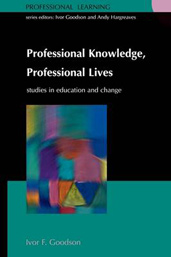Professional Knowledge, Professional Lives: studies in education and change
Educational Research as a Public Intellectual
Interestingly, Noam Chomsky has recently invoked the early 1800’s as the last time when the rich and powerful and industrial interests had truly unlimited powers. Until now, that is - in his recent Cambridge lecture he said: and his speaking about the present day:
There has been a recognition on the part of very powerful sectors that they have the population by the throat. They have an opportunity not just to fight a holding action against the increase of human rights and labour rights and democracy, but actually to roll it back and to restore the utopia of the masters of the kind that was dreamed of in the 1820's (Chomsky, 1995).
David Marquand, in a slightly more diplomatic manner has described the characteristics of the last period in British life.
The most obvious hallmark of the Thatcher and Major governments has been a ferocious onslaught on institutional autonomy, diversity and stability in the name of the rationality of the marketplace. Almost all the institutions which used to shield an unusually stable and diverse civil society from the arrogance of the politicians in temporary command of the state, or which embodied values and practices at variance with those of market economies, have felt the lash of this Tory Jacobinism ... One result is that the core executive at the heart of this state - the tiny group of senior ministers and top officials who make up the elective dictatorship which governs Britain - has to reckon with fewer countervailing powers than ever before in peacetime (Marquand, 1994).
Now the notion that the pendulum swings with regard to public knowledge is itself an ideological position for there are certainly those, at the moment, who argue for the ‘end of history’ and indeed, Chomsky himself has come close to this view. Whilst the ‘end of history’ is plainly an absurd notion taken literally, it does question whether the current re-allocation of global power constitutes a culminatory phase in the long march of the rich and powerful. If this were so, the assumption that the pendulum will one day swing back to more emancipatory notions of education has at least to be questioned if not as yet finally dismissed. If ‘end of history’ fails to capture the nuances, certainly the end of hope - of particular hopes such as social justice or redistribution - comes close to the mark. For the moment, as you will see, my position echoes the character in ‘Boys from the Blackstuff’ who, at the end of his life, still said "I just can't believe there's no hope".
